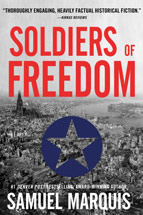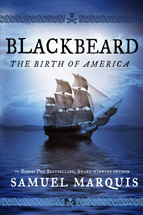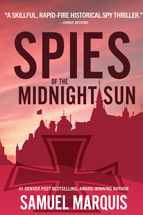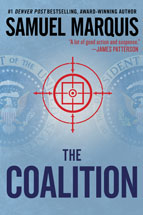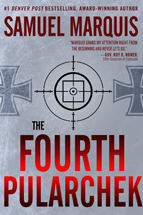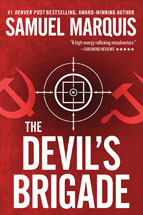BODYGUARD OF DECEPTION: VOLUME ONE OF THE WORLD WAR TWO TRILOGY
Bestselling, Award-Winning Suspense Author Samuel Marquis
“Bodyguard of Deception grabbed my attention right from the beginning and never let go. The character development is excellent. Samuel Marquis has a knack for using historic details and events to create captivating and fun to read tales.”
—Roy R. Romer, 39th Governor of Colorado
“Readers looking for an unapologetic historical action book should tear through this volume.”
—Kirkus Reviews
What would it have been like to have been a German officer on Pointe du Hoc a short distance from Omaha Beach on June 6, 1944, during the opening salvo of D-Day (see photo below of today’s remnant Allied artillery shell craters that have pock-marked the salient like the surface of the Moon). In the book excerpt below from Chapter 67 of Bodyguard of Deception, I give you a taste of what it was like to see the massive Allied fleet on the horizon and to feel the pounding of the Naval shells. I hope you enjoy it (but I must also issue a spoiler alert for those who plan on reading the book). Bodyguard of Deception is dedicated to the Allied heroes of WWII, as we celebrate the 72nd anniversary of the Normandy landings, the German collapse at the Falaise Pocket, and the Allies’ triumphant march into Paris.
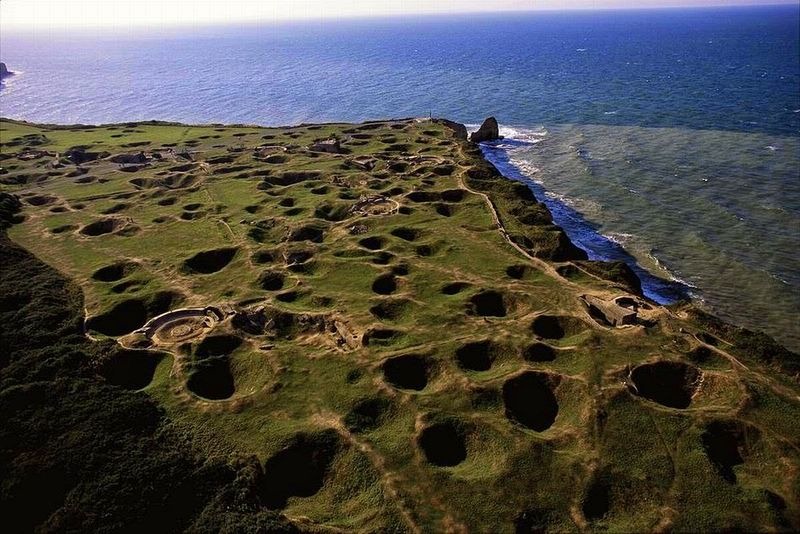
CHAPTER 67
POINTE DU HOC FORWARD OBSERVATION POST
NORMANDY COAST, OCCUPIED FRANCE
GENERALLEUTNANT ROBERT GRAF VON WALBURG—right-hand man to Rommel, who was at this very moment racing back from celebrating his wife’s 50th birthday in Herrlingen to Army Group B Headquarters at La Roche Guyon—stood atop a giant shore battery with his Wehrmacht 7×50 Zeiss binoculars aimed at the roiling sea. As the first streaks of dawn’s nautical twilight trickled across the Norman landscape of cliffs, dunes, and beaches, he hoped to catch a glimpse of the Allied flotilla of battleships, cruisers, supply ships, and small landing craft that might very well be heading towards the French coast. Only three hours earlier, the Allies had launched a massive airborne assault inland from the coast, which signified that the cross-Channel invasion had begun.
A part of him still couldn’t believe that his son Erik had succeeded beyond his wildest dreams and discovered not only the enemy’s order of battle for Fortress Europe, but their important double agent system. Now everything that the Allies had been doing to confuse Army Group B these past six months made complete sense. All OKW had to do was to use the new intelligence carefully and deliberately to turn the deception back onto the enemy for as long as possible. While ultimate victory may still be out of reach, an honorable peace would now most certainly be possible. But first, the enemy had to be driven back into the sea.
And yet, how could that happen when he and everyone else in the German army had that buffoon armchair-general, Adolph Hitler, to contend with!
From Rommel and von Rundstedt both, he had already learned that the little Bohemian corporal had refused not one, but two requests to release Panzer Group West from Paris and the 1st Panzer Division from Pas de Calais to Normandy. Upon learning of the Allies’ early-morning, inland airborne assault, Rundstedt had ordered the two reserve panzer divisions, the 12th SS Panzer and Panzer Lehr, to move immediately toward Caen to make them available for counterattack in Normandy. Walburg agreed with his two senior officers that the airborne landings appeared to be on such a massive scale that they could not be a mere deception maneuver and would have to be reinforced from the sea. The only place such large-scale landings could come in lower Normandy were on the Calvados and Cotentin coasts, and it was here, on the wide beaches north and south of Pointe du Hoc where they would need the critical reinforcements of Tigers, Panzers, Panthers, and StuG tanks to meet the expected massive Allied attack.
But the damned Führer—that maniac who would destroy an entire Wehrmacht division rather than give up an inch of ground—had forced Rundstedt to countermand the move-out order and recall the reserves. He had been sleeping—my God sleeping!—and General Jodl refused to wake him a third time. The two reserve divisions could not be committed until Hitler gave the order, and the last report was that he was still fast asleep like a hung-over grenadier.
Walburg couldn’t believe the fate of his entire country rested on such an imbecile. My God, they needed the damned tanks now while there was still cloud cover and Allied planes were mostly grounded, not a day or two from now. By then it would be too late. Three hours earlier Allied paratroopers had landed all along the peninsula and they could not be a mere deception.
Precious time was being wasted.
The pewter-gray predawn light began to play across the water. Stepping down from the massive concrete bunker, he walked to the tip of the point, a sharp protrusion of interbedded, fractured limestone, sandstone, and marlstone that stood a hundred feet above the Channel. Looking through his binoculars, first north and then south from the sharp rocky point—towards what his Allied adversaries had codenamed Omaha and Utah beaches and were soon about to make legendary—he saw a coastline bristling with murderous firepower and defensive strongholds that he had played a major role in creating.
For the past six months, he and the Desert Fox had worked tirelessly to build the “Rommel Belt” all along the coast from Holland to the Loire, throwing up a total of 20,000 coastal fortifications, emplacing 500,000 foreshore obstacles, and laying 6.5 million mines to create a “zone of death.” Peering up and down the coast, he gazed out upon countless batteries, mortars, machine-gun nests, thickets of barbed wire, land mines, antitank “hedgehogs” made from welded steel girders, concrete pyramid-shaped “dragons teeth” to slow down and channel tanks into “killing zones,” and more than a million upright stakes in the fields beyond, known as “Rommel’s Asparagus,” to impede airborne landings.
From bunkers, machine-gun nests, trenches, and gun emplacements, the German defenders would pour an inhuman wall of fire into the Allied attackers.
Studying the defenses, he took pride in having created one of the strongest positions on the Atlantic Wall. But even these well-fortified beaches would fall within hours of a full-scale amphibious attack without the powerful reserve tank divisions. What good was an inhuman “wall of fire” and “zone of death” when the Allies had all the advantage in airpower and seapower and a mentally unhinged tyrant refused to give his generals the panzers they needed to drive the invaders back into the sea?
He turned his binoculars again out into the Channel, searching for enemy ships and scout planes. To the west, the dark gray clouds and patches of clear sky blended with the slatey blue ocean like a Dutch oil on a canvas. Though the light was improving with every minute, it was still only 0530 hours and his visibility was limited even with binoculars. He stared at the white-capped rollers chugging towards the limey cliffs and sandy beaches.
He thought back to those simple summers on the Dutch coast and at the Broadmoor in America with his family before everything had changed. It haunted him to this day that he had allowed his family to be torn apart. How foolish he had been to let his wife and two sons trundle off to America following Hitler’s rise to power. How cowardly he had been to have allowed his wife have an affair with that damned Frenchman Renault just to spite him. Had he subconsciously wanted to drive her away? In the end, all he had done was throw away everything that was important to him—and now all that he was left with was a feeble, blood-drained facsimile of his once great Fatherland, a broken and beaten country led by a maniac who would slaughter all of his own people rather than do the honorable thing and surrender his armies to the Allies.
My God, he thought, how badly I have failed in this life.
Suddenly, the crash of a huge wave brought him back to the present. Was it his imagination or did he feel a vague presence, a change? No, he wasn’t imagining things. His soldier’s instinct told him something wasn’t right. He focused his binoculars on the distant horizon again, scanning for the Allied armada that would—
Wait, what was that? He could have sworn he saw a flicker of movement on the hazy horizon. He scanned again, adjusting the focus and squinting into his field glasses.
The breath caught in his throat.
It was like a dream—or more appropriately a nightmare—suddenly and miraculously transformed into a tangible reality.
He checked the horizon again to make sure. He couldn’t believe his eyes, and yet, what he saw was unmistakable.
Even in the diffuse predawn light, there was no doubt about it now.
Somehow, the moment he and everyone German soldier stationed on the Western Front had prepared for, and dreaded, for the past six months was actually happening: a fantastic armada—thousands upon thousands of ships—had crossed the Channel undetected and was about to impinge upon Festung Europa.
The Allied fleet was so big it looked like a floating city.
He briefly fingered the Iron Cross at his throat—he had won the same battle decoration as his son Wolfgang for his tank battle heroics in Tunisia—and loosened a button on his greatcoat, turned on a muddy boot heel, and started walking briskly towards the concrete observation bunker.
That was when the klaxon sounded and he heard the first shore battery open up.
He made a mad dash for the protection of the bunker. All along the coast shore guns began barking and thundering, the black splashes leaping from the sea in fountains of spray. By the time he had ducked into the bunker, a major with the 352nd Infantry Division in charge of the artillery forward observation post had already hailed Army Group B Headquarters. Walburg took the phone from him and was quickly routed through to Rundstedt, as Rommel had not yet arrived back from Herrlingen.
“Field Marshal, the invasion by sea has begun!”
“So the air assault was prelude to a seaborne invasion. I knew it!”
“It is no feint. There are thousands of ships. This is a large-scale attack, most likely from Saint-Mère Eglise all the way to Caen. Many, many ships. Our artillery is engaging them now!”
“How soon until the enemy hits the beaches?”
“Less than an hour!”
“We must cut them down at the beaches!”
“Yes, sir, and to do that we must have the panzer reserves! Our only chance is to drive them back into the sea and not allow them to secure a beachhead!”
“That is not your responsibility, General von Walburg! You are there as an observer!”
“But Field Marshal, without the panzers we have no hope at all!”
“You must leave that to me! Attend to the invasion front!”
“Damnit, man, we need those—”
He was cut off as a massive explosion rocked the bunker, followed by another and another, until the entire reinforced-concrete casemate was filled with an echoing wall of thunder from hundreds upon hundreds of naval guns opening up along a fifty-mile firing line.
“Field Marshal, Field Marshal!” he cried desperately, but the line was dead and Rundstedt was gone.
The bunker shook again and men jumped into battle positions. The Allied counterbattery bombardment had commenced with a roar so deafening that he couldn’t even hear the sound of his own voice. He quickly stuffed wads of cotton into his ears to prevent the shattering of his eardrums, as men in muddy field gray dove to the concrete floor, covered their ears, and stuffed them with whatever they could find to protect themselves from the concussive blasts.
Raising his binoculars, he peered through the slit-opening facing the sea as the radio man called in ship coordinates. He could see the muzzle flashes from the battleships’ 14-inch guns and the crimson parabolic arcs as the Allied shells soared towards the coast. Giant craters were being blasted out all along the chalky, grass-covered salient of Pointe du Hoc. Down on the beach and along the smaller bluffs, the smaller batteries, pillboxes, and machine-gun nests were also taking a terrific pounding.
The more protected bunker continued to reverberate from the terrifying explosions. The concussion ghosts rippled the men’s feldgrau uniforms like an advancing hurricane. The offshore battleships and cruisers created a continuous wall of sound that was made even louder by the thundering shore batteries and the screaming and shouting of the men in the bunker. The reinforced-concrete of the Pointe casemates was supposed to be impossible to penetrate, but within minutes a series of direct hits from the 14-inch shells had ripped out huge chunks of concrete, wrenched away steel reinforcing rods, and rendered deaf and unconscious half of the troopers inside the bunker. The air turned acrid with the stench of fresh powder. A fine confetti of disintegrated wadding filtered down like Vesuvian ash. The rain of iron created fresh stress cracks in the concrete, tore out any and all objects that were screwed or clamped to the walls, and shattered light bulbs.
Soon Mustang and Spitfire spotter planes zoomed overhead. Now that it was light enough for spotter planes to direct fire, they swooped in aggressively for a closer look, pinpointing muzzle flashes coming from the bluffs as well as heavily reinforced forward observation posts and shore batteries. With the Allies’ uncontested aerial supremacy, German soldiers recently had started joking that American planes were gray, British planes black, and Luftwaffe planes invisible. With the spotter planes now in the battle, the cannonade from the sea became even more concentrated and lethal. The huge naval shells continued to blast out giant craters in Pointe du Hoc, tumbling great chunks of cliff into the sea, pulverizing the casemates of the observation posts and artillery strongpoints.
Soon, he saw the massive enemy flotilla in all of its terrifying glory. Peering through his binoculars, he could swear he saw more ships than sea. There were three huge battleships, countless destroyers and heavy cruisers, and myriad smaller vessels with frothy whitewater spilling over the gunwales. Furthest offshore were the battleships, cruisers, and bulky transports, and in front of them raced the destroyers and landing craft, heading towards shore in columns of Higgins boats, DUKWs, LCIs, and LCTs. The sheer size of the assault force—with battle ensigns snapping and wakes boiling white—was staggering. In that illuminating instant, Generalleutnant Robert Graf von Walburg knew that his son Erik’s bold mission had ultimately failed in its objective. Germany was kaput.
And so was he.
He turned calmly on a booted heel, stepped out the door, and walked outside into the hailstorm of exploding artillery shells.
He knew it was all over and didn’t want to live anymore. He had failed as a father, failed as an Army commander, and in six months, his country would be in ruins.
What was the point of living in a world of nothingness and utter ruination with French peasants spitting and cursing at you and all of your material possessions seized from you and no one to love you and hold you when you grew old?
An artillery shell exploded twenty yards away and he tumbled onto the ground, his eardrums shattered and bleeding even through the cotton wadding.
He rose to his feet and staggered towards the jagged, craggy promontory. God, how he wished he could turn back his life and start all over again with his family. His beautiful boys, his wonderful wife, how had he let them all slip away? True, he had spent considerable time with Erik when Rommel had taken him onto his staff, and he had been granted a leave to be there in person for Wolfgang’s Iron Cross ceremony. But those few precious moments were not enough. His relationship with his two sons had been nothing more than a superficial bond among fighting soldiers with a common enemy.
It was not the same as a family.
He reached the edge of the cliffs, the projecting knob of Pointe du Hoc. On both sides he saw pill boxes, antitank sites, Nebelwerfer rocket-launcher pits, and artillery positions being devoured by the enemy cannonade. He stuck out his arms, as he supposed Christ might have done when nailed to the cross, and waited for the shell with his name on it to devour him.
“Kill me now, God!” he shouted, his voice drowned out by the roar of artillery. “For I have failed myself, my family, and Germany! I no longer want to live! No, I no longer deserve to live!”
Within moments of his appeal to a higher power, his final wish was granted and he was blown into a thousand bloody bits. His final earthly thought was a mental image of him, his wife, and three sons strolling through the Tiergarten on a sunny summer day, slurping ice cream cones as squirrels chased one another playfully through the giant oak trees.
In that final moment, it had seemed to General Robert Graf von Walburg as if his life would last forever.





